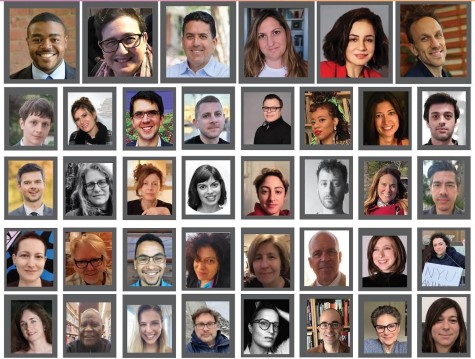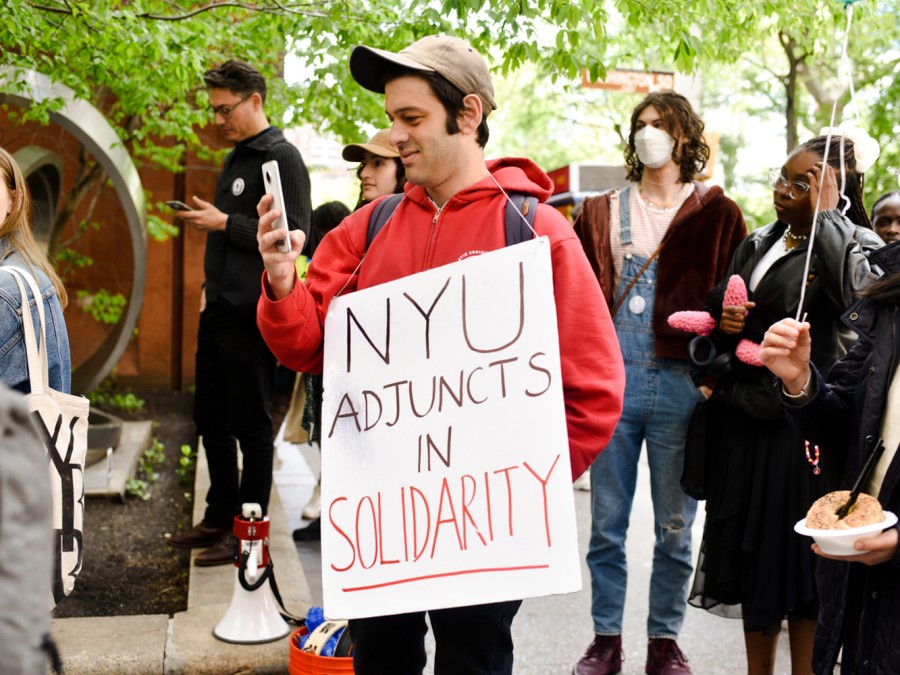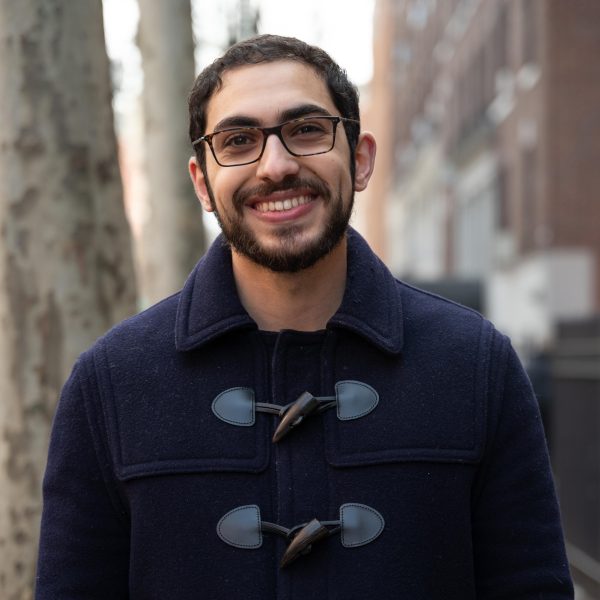Adjuncts at odds with current union leaders in run-up to internal election
A number of adjunct professors unsatisfied with union leadership will run for executive positions within NYU’s adjunct union, citing lackluster communication from current leadership.
File photo: NYU labor groups commemorate May Day at a rally near Bobst Library on Monday. (Adrita Talukder for WSN)
May 4, 2023
A group of adjunct professors have joined together to mount a challenge against the current leadership of the union that represents them, who they say have, at times, communicated poorly and been untransparent. The faction, which is called Workers in Unity, is fielding a number of candidates to contest the union’s upcoming internal election next week.
The adjunct union, ACT-UAW Local 7902, elects an executive board every three years by a popular vote of its members. This year, five of the 14 spots on the board are being contested. Workers in Unity candidates are vying for five of those positions, while 31 other candidates from the faction will run for positions on the union’s joint council, which oversees the executive committee and comprises members from NYU and The New School.
Workers in Unity formed in March, a few months after the adjunct union reached its most recent contract agreement with NYU last fall. The group of professors was concerned about inconsistent communication from the union’s leadership during the bargaining process for the contract, which led them to run for the positions themselves.
Charles Gelman, an adjunct at the Gallatin School for Individualized Study who is running for joint council on the Workers in Unity slate, said some members of the current executive board took credit for the gains in the new contract, including the increased wages it promised, without giving members outside of the leadership team recognition for their advocacy. He also said that the current leadership team would have settled for NYU’s initial proposals of smaller wage increases if not for pressure from the rest of the union.
“Now that we ended up getting much more, they are eager to associate themselves with these victories,” Gelman said. “We’ve sensed a lack of interest, if not contempt, for rank-and-file initiative and organizing, and the desire to maintain a very top-down voting structure within the union.”

Gelman said that Cate Fallon, who currently chairs the NYU unit of the union, has kept resources used for organizing, such as the union’s finances, hidden from members who do not serve on the executive board. Fallon had also wanted to disband a volunteer committee that undertook organizing efforts within the union.
“Our current unit chair, who is stepping down but running for joint council, wanted to dissolve the organizing committee and has prevented us from having access to the resources that are necessary effectively to organize our unit,” Gelman said. “The union has done a bad job in the past of getting new NYU adjuncts, and even adjuncts who have been here for some time, to sign their union card.”
Fallon declined to comment, instead referring questions to Zoe Carey, the union’s president, who pointed to recent efforts to improve the union’s financial transparency, such as its decision to publish more detailed revenue reports and breakdowns of the union’s expenses.
“This helps us identify trends in our expenses and income over the fiscal year, and understand when there are irregularities,” Carey said. “It also helps us create an annual budget to use member dues responsibly. Most importantly, this increased financial clarity helps the union allocate more funds to support our members, including creating funds to support bargaining for NYU adjuncts and New School part-time faculty during contract renegotiations last year.”
Judith Sloan, an adjunct instructor who teaches media studies courses at Gallatin and is also running for a position on the joint council, said that if elected, she wants to improve collaboration between different groups of workers in the union, which has four separate units — one for adjuncts at NYU and three for adjuncts, student workers and health care workers at The New School.
“The fact that we don’t share all of the issues with all of the four units so we can better coordinate and understand what is going on with each unit is a problem,” Sloan said.
Last November, the union reached a tentative agreement with NYU, solidifying a new six-year contract for adjuncts that included significant pay increases, compensation for administrative work done outside the classroom, better health care benefits and more. The agreement came after hours of marathon bargaining sessions between the union’s elected bargaining committee and NYU’s labor representatives, narrowly avoiding a strike that 95% of the union had voted in favor of.
David Vinjamuri, an adjunct professor at NYU’s School of Professional Studies who is running for a position on the executive board, said that while the new contract has improved labor conditions for adjuncts, they are still not being paid fairly, or enough.
“There are people living at the poverty level nationally in unions who teach, so what the group of us who came in — the Workers in Unity slate — really believe is that labor is not being paid fairly,” Vinjamuri said. “We don’t have appropriate job protections. We got some of it, but we didn’t get all that.”
David Palmer, an adjunct professor in Liberal Studies who is also running for the board, said that currently, the only information union members have access to is what’s included in weekly newsletters from union leadership, meaning most of the union does not see any reports or data about the work being done by their representatives.
“Information about the reps’ work is a careful cherry-picking of information about grievances they won and other successes,” Palmer said. “Information disclosed to members should be more accessible.”
Thousands of adjunct professors at NYU will be eligible to vote during the two-day election period, which begins Monday. The union will announce the results on May 11.
Contact Yezen Saadah at [email protected].

























































































































































